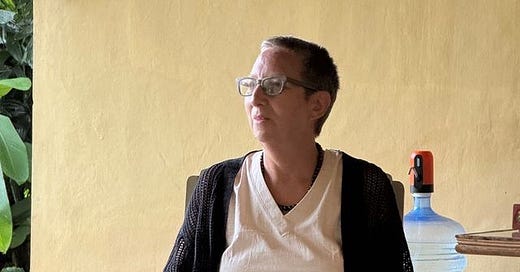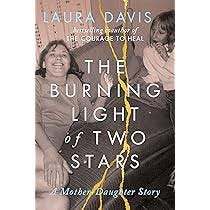Welcome to Pocketful of Prose, a community for sharing stories. Pocketful of Prose is free for everyone, but you can support my work by becoming a paid subscriber. Today, I’m so excited to share my interview with writer and author Laura Davis. As always, thanks for being here.
Without further ado, today’s pocket.
Laura Davis is a writing teacher and author of seven books. Her book The Courage to Heal, which she co-authored with Ellen Bass, and published in 1988, was a huge best-seller in North America and Europe. Laura’s book was a beacon for survivors of sexual assault. Her most recent book The Burning Light of Two Stars was published in 2021.
In addition to writing, Laura teaches writing workshops, weekly online classes and leads writing retreats all over the world. This year, she’ll be hiking on the Camino de Santiago, dipping her toes in the Pacific Ocean and traveling to Turkey, all while inspiring students to nurture the voice within. You can find out more about Laura’s retreats here.
I had the pleasure of sitting down with Laura over Zoom on a beautiful morning in late August. The timing couldn’t have been more perfect for me, as I had just finished my second big round of revisions on my memoir. I wrote a book folks, 86,000ish words, and just as I rounded the corner of my last punctuation mark, my thoughts turned to the challenges posed by putting my story out into the world, mostly what the people I love, the people I’d turned into characters in my book, would make of it. Would they forgive me for sharing parts of our shared life that they might prefer to keep hidden?
Laura knows these challenges better than anyone. In The Courage to Heal, the guidebook she wrote with Ellen Bass about healing from sexual abuse, she described her grandfather’s incest, something she’d only begun to unpack and heal from in her 20s. This brave choice created a huge rift between Laura and her mother and much of her extended family. In The Burning Light of Two Stars, Laura describes her mother’s reaction to her book tour and the popularity of The Courage to Heal, “You and your hate book. Traipsing around the country spreading lies about our family on national TV. You published that book just to destroy me!”
“When you publish a memoir,” Laura says, “you must ask yourself what’s the worst that could happen? You have to be willing to take that risk.” For Laura, the worst did happen. She and her mother were bitterly estranged for years, “but fortunately in our case, that estrangement didn’t last forever.”
Laura tells the story of that reconciliation, and the tumultuous relationship that preceded it, in The Burning Light of Two Stars. I read Laura’s captivating 339-page book over the course of three afternoons and evenings. When I stepped away from the book, I couldn’t stop thinking about it. I appreciated Laura’s honesty and vulnerability as an author, but most of all, I was awed by her forgiveness. When I finished reading the book, I wanted to talk about it, so I found my daughter Anna as she and I often share tidbits about books we’ve read. I explained the main points to Anna, and then I said, “It’s just so sad that her mother was never able to acknowledge what happened to Laura. I don’t know if I could forgive someone for that.”
I wanted to learn more from Laura about how she was able to do that, and so I posed this question to her. “Some people (me) might see your mother’s inability to acknowledge your story, your abuse, as unforgiveable, what do you say to those people? How did you find the strength and courage to forgive, and why was it important to you to do that?”
“What she did was unforgiveable,” Laura said, “and the fact that we were able to reconcile was a huge surprise to me, but my mother wasn’t just one way—the ogre I made her out to be for many years. It took me decades to realize that my mother actually tried to believe me. She got as close as she could to accepting what I’d told her. But she just wasn’t capable. Although she betrayed me when I needed her the most, I was able to see that she had a lot of other positive qualities. There was something to fight for in our relationship.”
More that 30 years passed between the publishing of Laura’s first book and her memoir, The Burning Light of Two Stars. I was curious about what was different for her this time around. “In my twenties, I saw everything as black and white,” she explained. “I was right—I knew my grandfather had abused me. The family members who didn’t believe me were wrong. They were horribly upset by my decision to publish The Courage to Heal, and I didn’t care. What I was saying was the truth, and I had a right to tell it. Thirty years later, I knew that those same relatives would be upset by my decision to publish my memoir. But this time, it was no longer just about who was right and who was wrong. I felt empathy for them because I understood how hard it is to have a writer—especially a memoir writer—in the family. I didn’t stop my plan to publish because of their concerns, but I was able show compassion and kindness in the way I communicated with them about it. I’ve been much more able to live in the grey.”
“As the author,” Laura says, “You hold the cards—you’re the one who gets to decide to publish your book. But you can still listen and be empathetic to other peoples’ concerns. Laura gave her mother and her brother her book draft and said to them, “Let me know if there’s anything you can’t live with.” Laura writes about this moment in The Burning Light of Two Stars.
I knew the outcome of this vulnerability as Laura’s book was in my hands, but my heart was in my stomach when I read this. What if they hadn’t given Laura their blessing? What if some of the changes they wanted to make were changes that she couldn’t live with? My initial understanding was that Laura was asking their permission, but in talking with her, I realized it wasn’t like that. “I was never not going to publish the book, but I had all the power. So, I could afford to be generous in my communication. My mom had a couple of small things she wanted me to change—and they were easy changes for me to make. My brother had always supported me in writing my memoir and was okay with being a character in it, but he wanted me to say more good things about him. And that was easy, too—he wasn’t just my antagonist! They both understood that I was going to take their feelings into account, but they both knew I still had the final say.”
Laura shared a story with me about a decision she made to reach out to one of her cousins before publishing her memoir. They shared the same grandfather, and her cousin had always dismissed Laura’s story, saying “he never abused me.” Before publishing The Burning Light of Two Stars, Laura wrote to her cousin to tell her that she’d written a chapter that included her aunt and uncle (her cousin’s parents) in a positive way. Laura wasn’t asking her cousin’s permission; she just wanted to be the one to tell her cousin that the book would be entering the world. Laura’s aunt and uncle had died, and she gave her cousin the option to choose pseudonyms for them. “Letting my cousin pick the names was a small way I could empower her in a situation in which she didn’t have a choice. I knew she wasn’t happy about my book, but I handled telling her in the most respectful way I could.”
For those of us who are writers, we can’t help but be who we are. We are storytellers, and as storytellers we need to tell our stories. We can’t not tell them, but I loved Laura’s perspective that there are ways to approach the sharing of our stories that are perhaps gentler on the ones we love.
Speaking of the ones we love, Laura also made the choice to minimize the role of her wife and her children in her memoir. Laura’s a public person who lives with people who are very private, and her relationship with her immediate family members is more important to her than anything else, more important than her writing. So, she didn’t craft them as full-on characters in her memoir. She didn’t reveal any of their vulnerabilities. As a result, her portrayal of them is flatter than it might have been, but she wanted to honor their privacy, and she felt that the emotional depth of the book could be carried by the far deeper, more complex portrayals of herself, her mother and her brother.
When I teach my memoir class, Anne Lamott’s infamous quote about truth telling in memoir always comes up; “If people wanted you to write warmly of them, they should have behaved better.” It always gets a good laugh, but while I love Anne Lamott, I never believed it was as simple as that, especially not when we’re writing about those closest to us. Like Laura, I no longer see the world in black and white. Stories are never simple, especially when people’s feelings are involved. I’m so grateful for my conversation with Laura. It’s not often that I have the opportunity to direct my burning questions about a book to the author herself. In addition, Laura’s words were a light on my path reminding me of the gift and power I hold as a memoir writer, a power that allows me to be as gracious as I possibly can.
If you want to read The Burning Light of Two Stars, or any of Laura’s books, you can find them here.
I would love to continue this conversation in the comments. What resonated with you? Share a story or personal connection or book rec with us.






So thoughtful. I didn’t realize Laura authored the C outage to Heal. I read that early on in my quest to deal with sexual abuse and it was literally life-changing. Kudos to you for doing this interview with her. This is so complex when you’re writing memoir and dealing with other people’s feelings about it. I go back and forth with my opinions about it, clearly not black and white but something I think every writer must determine from their own stories. Great piece.
Wonderful interview/discussion. Laura’s reflection on how their personal truth was (and still is) perceived by those closest to them is admirable and appears to be steeped in grace or forgiveness. This must have been an incredibly courageous journey. I must read. Thank you for helping Laura to share their story, though too, I didn’t find the title of your own 86,000 page memoir. Congratulations! Was this a deliberate omission? Please share, when ready. 👍